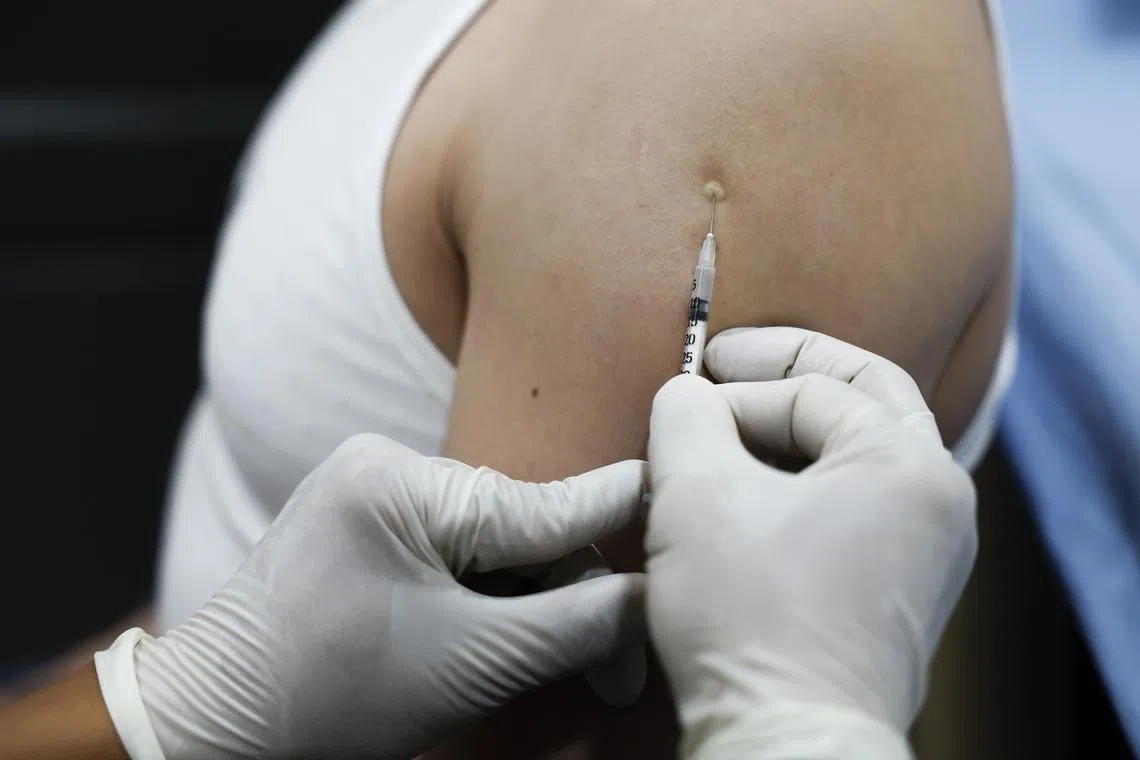Older S’poreans vaccinated for smallpox shielded from mpox
Sign up now: Get ST's newsletters delivered to your inbox

As smallpox and mpox are both orthopoxviruses, there is some cross-protection conferred by the vaccination.
PHOTO: EPA-EFE
SINGAPORE – Most older Singaporeans who were born in or before 1980 and were vaccinated against smallpox in childhood would have fairly good protection against mpox.
As smallpox and mpox are both orthopoxviruses, there is some cross-protection conferred by the vaccination.
In Singapore, vaccination against smallpox was made mandatory in 1869. This was discontinued in 1981, following a 1980 declaration by the World Health Organisation (WHO) that smallpox had been eradicated globally.
The Jynneos vaccine now given for mpox is also a vaccine used to protect against smallpox. This vaccine, third generation for smallpox, is 80 per cent effective in preventing mpox infection.
The earlier, first-generation vaccine is 95 per cent effective in protecting against smallpox, according to the Centres for Disease Control and Prevention (CDC) in the United States. Later-generation vaccines are safer.
Professor Hsu Li Yang, vice-dean for Global Health at the NUS Saw Swee Hock School of Public Health, said that vaccine protection drops over time, although protection against death from smallpox will last for decades.
He said people who have had smallpox vaccination, should they get infected with mpox, are likely to have less severe symptoms.
Mpox is usually a self-limiting disease, with symptoms that include fever, muscle ache, swollen lymph nodes, exhaustion and painful or itchy blisters.
WHO declared mpox a public health emergency of international concern
Health Minister Ong Ye Kung will be chairing a press conference in the first week of September
Prof Hsu said the current mpox clade Ib has a reported case fatality rate of approximately 3 per cent, although in a country with good healthcare resources, it should probably be less than 2 per cent.
The clade II responsible for the 2022/23 outbreak had a mortality of about 0.1 per cent, according to the US CDC.
Professor Paul Tambyah, president of the International Society for Infectious Diseases, said a study of 1,573 close contacts of mpox patients done in the Democratic Republic of Congo 40 years ago showed that 1.1 per cent who had been vaccinated against smallpox got the disease, compared with 7.4 per cent who had not been vaccinated.
He added: “More recently, another study showed that individuals who were vaccinated (against smallpox) as far back as 88 years ago had very high levels of protective antibody titres.”
Dr Asok Kurup, an infectious diseases expert in the private sector, said a recent study of military personnel in the US – 2.6 million people were vaccinated between 2002 and 2017 – also showed protection from the first-generation smallpox vaccines.
Prof Hsu, an infectious diseases expert by training, said: “The evidence we have, based on older smallpox vaccines, is that protection against death from smallpox is long-lasting (for decades), especially after complete vaccination.”
Complete vaccination requires two doses.
In Singapore, it was administered to children in the first months of life, with a booster given when they were around six years old when they entered school.
Even if mpox does spread in Singapore, the experts do not expect it to become endemic
WHO has said mpox is transmitted mainly through sex or close contact with people, such as family members living in the same house. There is, so far, no evidence of airborne spread, which means it will not spread easily the way Covid-19 does.
Said Prof Tambyah: “Proven non-sexual transmissions are very rare and those which have been documented have been for the earlier clade Ia virus and mainly from animals to humans.”
He said the most important thing to do would be for people to seek medical attention if a partner has unusual rashes.
Pointing to a study done in China and published in 2024 that showed a significant overlap between mpox, human immunodeficiency virus and syphilis, he added: “All sexually transmitted infections should be treated and this can be an opportunity for the screening for mpox and identification of cases and contact tracing to vaccinate people who might have been exposed to the virus.”



